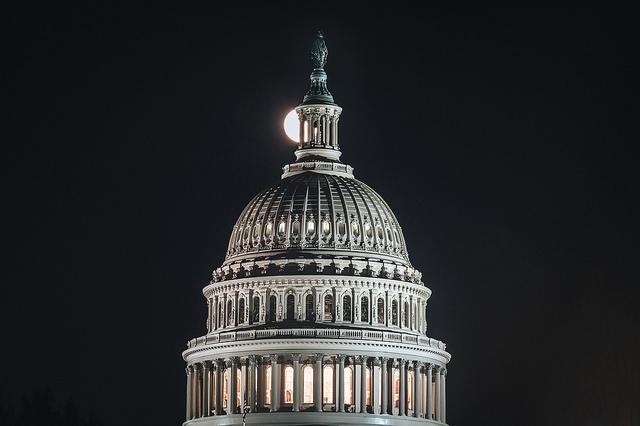New Australia caucus in Congress needs Australian leadership
Posted By Caitlin Gauci on December 8, 2017 @ 11:05

The 2017 foreign policy white paper reiterated the need [1] for Australia to ‘advance our values and our national interests’ and to deepen ties with the US. The revived Friends of Australia Congressional Caucus in Washington is a useful vehicle for pursuing both of those aims.
The caucus’s recent launch [2] demonstrates the deep goodwill towards Australia on Capitol Hill. And it is already proving useful in the Trump era—last week, the caucus hosted a briefing [3] on the white paper with the Australian embassy in Washington. But Australian leadership will be required for it to maintain relevance and contribute meaningfully to a closer bilateral relationship.
The caucus sprang directly from the infamous telephone call [4] between President Donald Trump and Prime Minister Malcolm Turnbull last January in which Trump ‘badgered, bragged and abruptly ended’ [5] the call. In response, more than 50 members of Congress called Australian ambassador Joe Hockey to express their solidarity with Australia. But now, as the phone call drifts into history, members of Congress start to focus on the 2018 midterm elections, and the Australian embassy’s ‘100 years of mateship’ [6] campaign approaches its end, the caucus risks becoming a non-entity.
Consider the life cycle of the previous Australian caucus. It was established in 2003 to capitalise on the goodwill generated in Washington by Australia’s involvement in the Iraq War. The caucus was crucial in securing the passage of the Australia–US free trade agreement with overwhelming majorities in both houses, and in gaining the E3 visa, which makes it easier for Australian professionals to work in the US. These were impressive achievements in the caucus’s first two years, but it then lost its raison d’être and soon ceased to exist. Both of its original co-chairs [7] left the House of Representatives in 2005 and one has since passed away.
Many congressional caucuses quickly lose meaning. There are so many caucuses on Capitol Hill that members of Congress simply don’t have the time to actively contribute to them all. Since 2000, the number of caucuses has quadrupled [8]: there is now more than one for each member of Congress. Members of Congress are sometimes deeply committed to the cause of a caucus or two, but often are nominal members of many more. On average, senators belong to about 18 caucuses and representatives belong to 34 [9]. Caucuses seemingly exist for everything: there’s a bourbon caucus, a bike caucus and a shellfish caucus.
Caucus membership varies greatly. While many are bipartisan, some such as the House Tea Party Caucus operate more like party factions [10]. Similarly, the Congressional Black Caucus—overwhelmingly made up of Democrats [11]—has exercised significant influence for decades. In the 1980s, it helped spearhead legislation that imposed sanctions on apartheid South Africa, and helped override President Ronald Reagan’s ensuing veto [11]. This year, it has been vocal in its criticism of Trump, especially over his comments [12] after racially fuelled events in Charlottesville, Virginia.
The Australia caucus will never have that level of influence. But with effective leadership from Canberra and the Australian embassy in Washington, it can be a helpful vehicle for Australian interests. Both Republicans and Democrats agree on the importance of the relationship with Australia. The caucus has bipartisan co-chairs in both houses: Roy Blunt (vice chairman of the Senate Republican conference) and Dick Durbin (the second-highest ranking Democrat) in the Senate; and Republican Mike Gallagher and Democrat Joe Courtney in the House of Representatives, both of whom sit on the Armed Services Committee. Steny Hoyer, the second-highest ranking Democrat in the House of Representatives, attended the launch. More than 70 members of Congress have joined the caucus.
Regardless of these members’ affinity for Australia, they know that time spent with the Australia caucus will have a negligible impact on their domestic political goals, much less their prospects of re-election. There’s a clear and present risk that the caucus will drift into obscurity over the next 11 months leading up to the 2018 mid-term elections.
To avoid that, Australian leadership will be needed. The caucus has the drawing power to attract key members of Congress. Any Australian minister visiting the US should make time to address the group. Another idea is to create a mutual exchange system [2] between members of Congress and Australian parliamentarians. Reciprocal visits would promote engagement between the legislatures. Finally, the Australian embassy could involve the caucus in next year’s busy program of World War I commemorations.
If the caucus can eventually outlive its previous iteration or outdo its level of influence, Australia will benefit from the group’s existence. But an influential Australia caucus in Congress will require sustained Australian effort and creative thinking.
Article printed from The Strategist: https://aspistrategist.ru
URL to article: /new-australia-caucus-in-congress-needs-australian-leadership/
URLs in this post:
[1] reiterated the need: /the-2017-foreign-policy-white-paper/
[2] caucus’s recent launch: http://www.afr.com/news/world/north-america/another-door-into-washington-20171009-gyx4jr
[3] hosted a briefing: https://twitter.com/dougalrobinson/status/932471012360200192
[4] infamous telephone call: /transcript-turnbulltrump-call-re-examined/
[5] ‘badgered, bragged and abruptly ended’: https://www.washingtonpost.com/world/national-security/no-gday-mate-on-call-with-australian-pm-trump-badgers-and-brags/2017/02/01/88a3bfb0-e8bf-11e6-80c2-30e57e57e05d_story.html?utm_term=.95b3cd1ba11c
[6] ‘100 years of mateship’: http://usa.embassy.gov.au/whwh/Mateship.html
[7] original co-chairs: http://www.gettyimages.com.au/license/74899196
[8] quadrupled: https://fas.org/sgp/crs/misc/R40683.pdf
[9] 18 caucuses and representatives belong to 34: https://www.theatlantic.com/politics/archive/2014/04/congress-caucus-for-everything/360894/
[10] operate more like party factions: https://theconversation.com/can-congress-build-bipartisanship-through-caucuses-64286
[11] made up of Democrats: https://www.theatlantic.com/politics/archive/2016/04/congressional-black-caucus-donna-edwards-black-lives-matter/480180/
[12] over his comments: https://www.nbcnews.com/news/nbcblk/black-caucus-vows-root-out-racism-federal-policy-white-house-n794221
Click here to print.